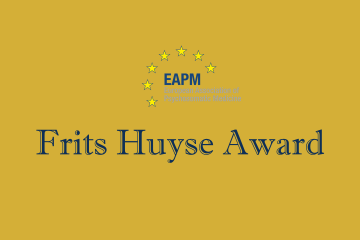Severin Hennemann is the winner of the Elsevier/EAPM Young Investigator Award 2022

Brief summary of the award-winning work
Persistent somatic symptoms (PSS), which can be more or less medically explained, are a common phenomenon and can lead to significant mental distress and impairment. Meta-analytic findings suggest that cognitive behavior therapy (CBT) is mildly to moderately effective in reducing somatic symptom distress associated with PSS. However, access to adequate treatment is often difficult and delayed. Internet-delivered interventions may constitute a promising option to prevent burden and chronicity. In a two-armed RCT, we could demonstrate the efficacy of an eight-week, psychologist-guided, Internet-based CBT (iSOMA) in university students with both subclinical and clinical degrees of somatic symptom distress as compared to a waitlist (both study arms with access to treatment-as-usual). The question for whom these interventions “work” (or not) is crucial for improving individualized treatment strategies. Therefore, in this study, we explored pretreatment variables as putative moderators of the primary outcome (somatic symptom distress, assessed via PHQ-15 at eight-week post-measurement) between the active compared to the control intervention in 156 emerging adults. Our findings indicate that a guided Internet-delivered CBT for somatic symptom distress should be recommended over passive interventions such as waitlist, particularly for individuals with elevated levels of somatosensory amplification (i.e., the dispositional tendency to experience a somatic sensation as intense, harmful, and disturbing), which represents a cognitive risk factor for the emergence and maintenance of PSS. Other variables such as demographic characteristics, health-related variables, mental distress, or emotional reactivity did not moderate the outcome between the groups. Our results thus highlight the role of biased somatosensory processing of somatic symptom experience in the treatment selection of individuals with PSS and as a potential mechanism of action.
For more information, please see:
Severin Hennemann, PhD (University of Mainz, Germany)
Dr. Severin Hennemann studied psychology in Frankfurt a.M. (Germany) and Lisbon (Portugal) from 2007 – 2012. Afterwards, he completed a three-year Ph.D. program at the University Medical Center in Mainz (Germany), with a scholarship from the Illa and Werner Zarnekow Foundation. His research included qualitative and quantitative methods to study the acceptance and implementation of eHealth interventions in medical inpatient rehabilitation. Since 2016, he is a post-doctoral researcher and lecturer at the Department of Clinical Psychology, Psychotherapy & Experimental Psychopathology (lead by Prof. Dr. Michael Witthöft) of the Johannes Gutenberg University Mainz. His research focuses on the acceptance, efficacy and implementation of digital interventions in the prevention and treatment of persistent somatic symptoms and associated disorders. Dr. Hennemann is a licensed clinical psychologist in cognitive behavioral therapy and practices at the outpatient psychotherapy clinic of the University of Mainz.
Selected Publications
Hennemann S., Böhme K., Kleinstäuber, M., Baumeister, H., Küchler, A.-M., Ebert, D.D., Witthöft, M. (2022). Internet-based CBT for somatic symptom distress (iSOMA) in emerging adults: a randomized controlled trial. Journal of Consulting and Clinical Psychology, advanced online publication. https://doi.org/10.1037/ccp0000707
Hennemann, S., Kuhn, S., Witthöft, M., Jungmann, S. (2022). Diagnostic Performance of an App-Based Symptom Checker in Mental Disorders: Comparative Study in Psychotherapy Outpatients. JMIR Mental Health, 9(1):e32832 https://doi.org/10.2196/32832
Philippi, P., Baumeister, H., Apolinário-Hagen, J., Ebert, D. D., Hennemann, S., Kott, L., Lin, J., Messner, E.‑M., & Terhorst, Y. (2021). Acceptance towards digital health interventions – Model validation and further development of the Unified Theory of Acceptance and Use of Technology. Internet Interventions, 26, 100459. https://doi.org/10.1016/j.invent.2021.100459
Hennemann, S., Farnsteiner, S., Sander, L. (2018). Internet- and mobile-based aftercare and relapse prevention in mental disorders: A systematic review and recommendations for future research. Internet Interventions,14,1-17. https://doi.org/10.1016/j.invent.2018.09.001
Please see my website for a complete list of all my publications: https://klipsy.uni-mainz.de/abteilungsmitglieder/hennemann/


